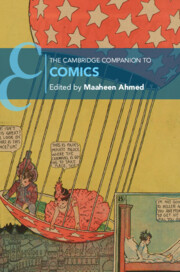Book contents
- The Cambridge Companion to Comics
- The Cambridge Companion to Comics
- Copyright page
- Contents
- Figures
- Contributors
- Acknowledgments
- Chronology
- Introduction
- Part I Forms
- Part II Readings
- Chapter 6 Comics and Multimodal Storytelling
- Chapter 7 Comics Adaptations
- Chapter 8 Comics Genres
- Chapter 9 Life Writing in Comics
- Chapter 10 Racialines
- Chapter 11 Women and Comics
- Chapter 12 Comics at the Limits of Narration
- Part III Uses
- Further Reading
- Index
- Cambridge Companions To …
- References
Chapter 12 - Comics at the Limits of Narration
from Part II - Readings
Published online by Cambridge University Press: 17 August 2023
- The Cambridge Companion to Comics
- The Cambridge Companion to Comics
- Copyright page
- Contents
- Figures
- Contributors
- Acknowledgments
- Chronology
- Introduction
- Part I Forms
- Part II Readings
- Chapter 6 Comics and Multimodal Storytelling
- Chapter 7 Comics Adaptations
- Chapter 8 Comics Genres
- Chapter 9 Life Writing in Comics
- Chapter 10 Racialines
- Chapter 11 Women and Comics
- Chapter 12 Comics at the Limits of Narration
- Part III Uses
- Further Reading
- Index
- Cambridge Companions To …
- References
Summary
Discourses about comics focus very often on their narrative dimension to the extent that they are frequently considered as narratives per se. Driven by the ambition to rethink established formulas, alternative publishers show examples of works that invite to move beyond this approach. This chapter looks at comics that do not tell a story (in the narrow sense of the word) or question familiar narratives. It focuses on abstract comics or comics made of series of unrelated images. Building on the works of creators that tend to remain under the radar such as Rosaire Appel, Renée French, Tim Gaze, or Bianca Stone, this chapter delineates possibilities for understanding these creations and the specific kinds of pleasure they generate. By highlighting their links with other media, in particular music and poetry, it emphasizes how the reader’s response is closely linked to their horizon of expectations. Finally, it shows that the study of comics that are at the limits of narration allow to reassess how we see comics in general, including those that privilege the story.
- Type
- Chapter
- Information
- The Cambridge Companion to Comics , pp. 244 - 264Publisher: Cambridge University PressPrint publication year: 2023

